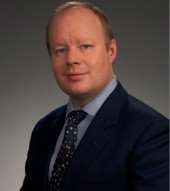 Cromwell Coulson, the president and CEO of OTC Markets Group, and he plainly sees himself as something of a rebel.
Cromwell Coulson, the president and CEO of OTC Markets Group, and he plainly sees himself as something of a rebel.
In early February he participated in the Securities and Exchange Commission’s roundtable on penny pricing, that is, decimalization, and he was among those making the case at that event for a pilot program. I contacted Mr. Coulson soon after that event, and recently enjoyed a wide-ranging conversation.
Hub-and-Spokes versus Networks
The OTC Markets Group is a platform that provides liquidity and transparency to the world of over-the-counter equities and debt instruments. Of the significance of this role, Coulson said: “The exchanges run on an old-school hub-and-spoke business model with which they grew up and now they’ve attached it to the internet. At OTC Markets Group, on the other hand, our model has always been network based.”
He made an analogy to the liquor industry in the U.S., where “tied house laws” keep separate the three tiers of the industry: manufacturers, distributors, retailers. With narrow exceptions, no entity can belong to any two of those shares – a retail liquor establishment cannot manufacture or distribute liquor and so forth. Such a system – like that of the centralized stock exchanges -- seems increasingly archaic among disintermediation everywhere else.
Just as one buys bourbon from a retailer who buys it from a distributor who buys it from the manufacturer, so in the world of stocks someone desiring a share of Apple will call a broker who will often go through an exchange which matches him with the broker for a seller. But in a networked world, one can disintermediate. This was the theme of a recent article of Coulson’s in the OTCMarkets newsletter, to which he referred me. He wrote there that the networked model “is creating efficiencies for investors by providing buyers and sellers with a choice of trading partners and forcing intermediaries to add value or potentially be left out of the trade.”
Consolidation
I asked Coulson for his take on the consolidation of exchanges, especially in light of the ICE/NYSE deal announced in December. This came after a previous wave of consolidation had crashed upon the beach of unfriendly regulators, in Australia, Canada, and the EU. But does the persistence of the urge to merge suggest that there are genuine economies of scale that consolidation would exploit?
“There are two sides to this,” Coulson said. “On the one side, you can say, 'Let's merge, let's have a larger scale.' On the other, you can say, 'Let's regionalize. Let's have a tighter focus.' The latter allows you to grow organically rather than stitching parts together. I think organic growth is more valuable over the long term."
We spoke of the private equity world and its role. Coulson said that of course PE does have a role, but there are good reasons why businesses want to go public, reasons that go beyond the simple desire for a cash infusion. There is visibility, there is the prospect of building trust both with shareholders and through them with a broader stakeholder community, and there is valuation. The public markets, exchange and OTC, provide a running commentary on value that is a valuable benchmark.
Don’t Trust Anyone over Thirty
But, I asked, don’t threats such as the shark-like HFT operators threaten to do damage to these valuable public markets? I spoke loosely of HFT’s “gaming the system,” and Coulson took offense.
“There is nothing new or especially alarming about what HFT traders do. It is comparable with the dealers in the room at an art auction at Sotheby’s. They’ll see where the price activity is. Some will bid when the price activity is slow, to pick up a bargain. Some will bid when there’s a lot of interest not in order to make a purchase but to drive up the eventual price that an enthusiastic buyer is willing to pay. Why? Perhaps it’s a Warhol and the dealer has an inventory of Warhols so he wants a higher published price for this one.”
We talked about regulatory proposals such as an order-to-trade ratio, or a mandatory minimum waiting period between an order and its cancellation. “Nobody under the age of thirty thinks slowing down the speed of trading is a good idea.”
Germany's Bundestag just voted on a bill that opens the door to such regulation, I said.
"You might look into the average age of members of the Bundestag,” he said. “I bet they grew up before the computer age. The vast majority of people who trade using HFT technology are not into quote-stuffing. They provide a price setting service and are using the technology to give themselves an edge, just as before electronic Edgar filings, firms might have somebody waiting at the SEC office to read the newest paper filings, another way of getting an informational edge. Just as the Rothschilds used carrier pigeons. This is all part of the process of getting to a market price point that represents an equilibrium of supply, demand, fear and greed.”



